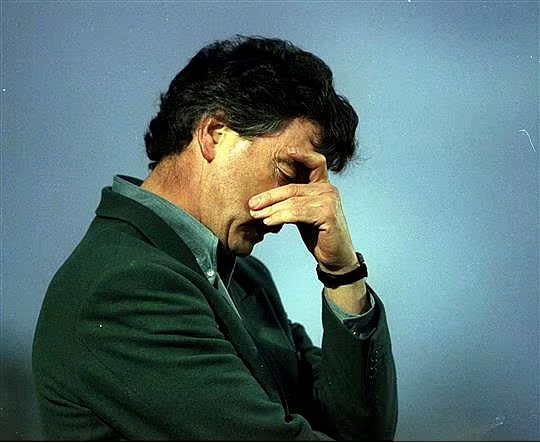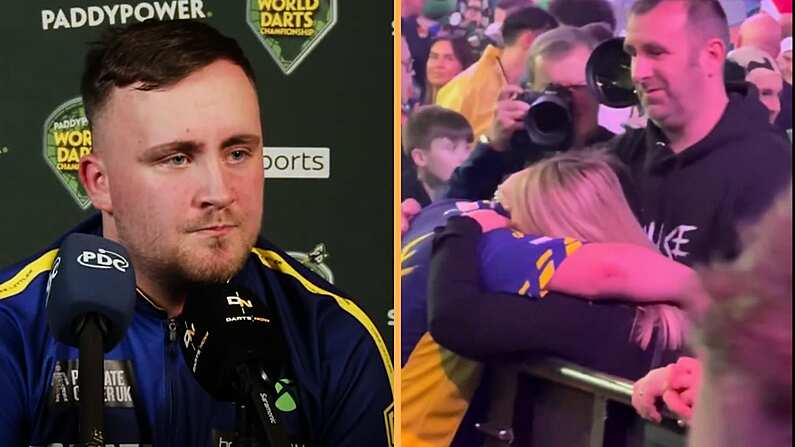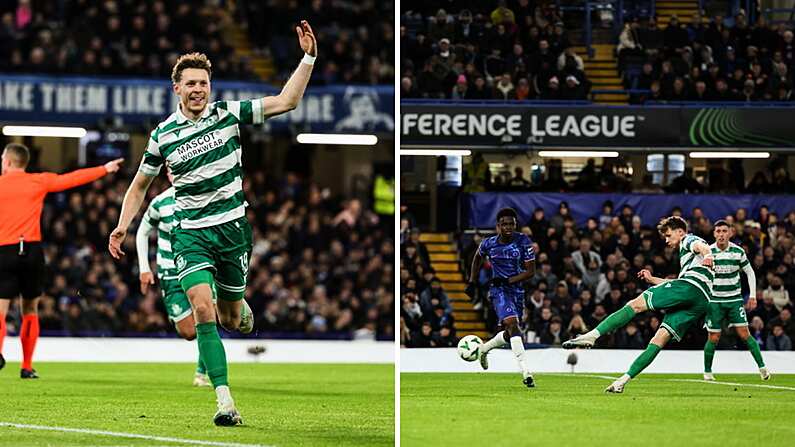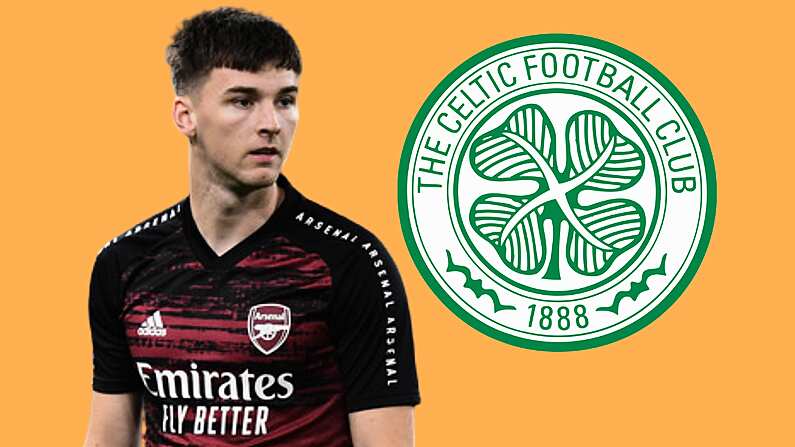Six of the most gut-wrenching title losses in living memory. Here are teams who led the League entering the final game of the season only to throw it away. From 1972 to 2002.
Hearts - 1985-86
18 months before he wrote his name into Irish football folklore, Gary Mackay was a member of a Hearts team who tossed away the Scottish League in excruciating fashion on the final day of the 1985-86 season.
Their opponents that day would provide Celtic fans, and indeed Hibs fans, with their very own Gary Mackay figure. Though he has not been honoured by Queen Elizabeth, Albert Kidd is known as 'Sir Albert Kidd' around Easter Road.
The 3rd of May has even been re-designated 'Albert Kidd Day' by Hibs supporters, though the United Nations has yet to officially recognise it as such.
Not only were Hearts two points ahead of Celtic in the title race - bear in mind only two points were awarded for a win at that time - they enjoyed a goal difference advantage of +4.
While most papers said they only required a draw to clinch the League, there was a fair chance that a narrow defeat would still be enough too.
Considering that Hearts hadn't lost a match since 25 September, it was probable they wouldn't need to worry about the maths. The club's first League title since 1960 was close to being a formality.
Both title chasers had potentially tricky away games against mid-table opposition. Hearts had to play Dundee in Dens Park. Celtic, meanwhile, had to travel to Love Street to play St. Mirren, a venue at which they'd struggled only a month before.
It's easy to see how nerves took root in the Hearts players. Before half-time, news seeped through that their goal difference advantage had been wiped out.
Celtic - with Brian McClair, Paul McStay, Danny McGrain and then darling Mo Johnston in full cry - ripped through a hapless St. Mirren. They led 4-0 before half-time. The 3rd goal - a sweeping move involving the four above players - showed the Celtic side at their scintillating best. Early in the 2nd half, McClair made if 5-0.
Celtic had done enough and ratcheted up the tension for the Hearts supporters and players. But as long as Hearts held out, there was nothing they could do.
With seven minutes remaining in both games, Paul McStay whipped in a cross which was claimed by the St. Mirren goalkeeper. At that moment, right behind him, the Celtic supporters started leaping about celebrating.
The commentator was quick to put two and two together.
Now that must be a goal for Dundee. Sheer bedlam around the stadium. Well, you don't need to hear anymore news than that. Dundee clearly have scored at Dens. And it's lift-off at Love Street.
The roar told us that substitute winger Albert Kidd had turned home a goal in the Dundee-Hearts game.
Over at Dens Park, legendary commentator Archie MacPherson, expecting to broadcast on a coronation, took up the story.
And this is so agonising for Hearts! Will this championship disappear from their very eyes? Kidd, what a marvellous substitution this has been for Dundee and Hearts (are) looking slightly ragged. It's a great chance! He's done it. Two-nothing. A brilliant goal! By Kidd. His second.
A week later, a shattered Hearts were destroyed by Aberdeen in the Scottish Cup Final, Alex Ferguson's last game in Scottish football. Fergie could only express his sympathy with manager Alex McDonald. Needless to say, Hearts haven't won the League since. Glasgow reclaimed the Scottish title in 1986 after Aberdeen's back-to-back wins and haven't let go of it since.
Bohemians 1992-93
The League of Ireland authorities weren't so pedantic to bother with goal difference back in the 1980s and early 1990s. Totting up the goals scored and goals conceded of teams on equal points was quite beyond the league's statisticians.
The LOI finally embraced goal difference ahead of the 1993-94 season. That was too late for Eamonn Gregg and Bohemians whose far superior goal difference was no use to them at the end of the 1992-93 season.
Bohs, who hadn't won the League in 15 years, finished the season at the top of the table but on the same number of points as Shelbourne and Cork City. Shels had a goal difference of +14, Cork were a goal further behind on +13. Bohemians, who only conceded 19 goals that year, were way ahead on +27.
But because the League paid no heed to goal difference, Bohs were made scrap it out for the title with Shels and Cork. This would take longer than expected as all three teams finished on 3 points after the round robin. Goal differences were identical for what it's worth. That Shelbourne has scored more goals than the other two wasn't considered.
The authorities were getting impatient now as they removed the home and away ties and insisted on the teams only playing each other once in a neutral venue.
Cork beat Bohs and Shels to take the title, rendering Bohemians' win over Shelbourne irrelevant.
None of it would have mattered had Bohemians taken care of business on the final day of the actual season over a month before all this. A point would have done them but they faced a horribly difficult assignment in Oriel Park, the home of the 1991 champions Dundalk, and something of a graveyard for teams chasing titles. (Isn't that right, Damien Richardson?)
Tom McNulty's goal did the damage and Bohemians frittered away a golden opportunity to take the title. They'd have to wait until the turn of the millennium to reclaim the championship.
Thanks to killianm2 for furnishing the world with this video
Leeds United 1971-72
A rather more pedestrian Leeds United team would capitalise on Manchester United's collapse exactly two decades later. However, the championship was wrapped up on the final day in 1992.
There was severe congestion at the top of the table at the climax of the 1971-72 season. Entering the final day of the season, Leeds United were pursuing a League & Cup Double, the first in their history.
Oddly, the FA Cup Final was played before the final round of First Division matches. Alan 'Sniffer' Clarke's diving header gave Leeds a 1-0 win over Arsenal.
A Leeds draw away at Wolves would effectively guarantee them the title. If they earned a point, then Liverpool would need to beat Arsenal 11-0 at Highbury to rob them of the title. Not feasible. But should Leeds lose at Molineaux, then Liverpool were waiting to pounce, away to a team already demoralised from their Cup defeat the week before.
There was a somewhat more far out scenario. If Leeds lost and Liverpool failed to win, then Derby County, who had already completed their League programme, would be crowned champions.
Cloughie and his staff weren't hanging on the news of the result. They'd more or less discounted the possibility. The players had taken themselves off to Majorca while Clough himself went to the rather less glamorous Scilly Isles.
Wolves, in 9th place and with nothing tangible to motivate them, beat Leeds United 2-1. The Italians would be disgusted. Revie spent the aftermath bemoaning refereeing decisions. Leeds blew another title. They would only win two championships in Revie's era, despite being comfortably the best team during the first half of the 1970s.
Liverpool blew their chance to capitalise as they were held to a scoreless draw. Lounging on the beach in Spain, the Derby players learned they were Champions of England.
Brian Clough resented for the rest of his life the dopey and grudging assertion that Derby County won the League by default. He justifiably pointed out that a League season is 38 games and the winner is the team with the most points at the end.
Liverpool 1988-89
Has been retrospectively compared to Manchester United losing the title in the final seconds in 2012. Though we didn't know it at the time, both events occurred in the twilight of the two teams' respective periods of dominance. Both teams won relatively handy titles the following year and thereafter were pitched head first into the wilderness.
The details of the match barely need sketching. It is one of the most famous matches in the history of English football and certainly the most famous game of the 1980s. At a time when live televised football was very far from ubiquitous, ITV screening a historic league title decider was a major event.
Championship deciders are ten-a-penny in other sports, in football they are dependent on the luck of the fixtures computer.
Arsenal led the league for most of the season but suffered a costly mini-implosion in the final weeks of the season. Liverpool beat West Ham 5-1 in their penultimate game leaving Arsenal needing a two-goal victory in Anfield, a task which the tabloids assessed as a nigh-on impossible.
In his pre-match team-talk George Graham gambled and insisted that Arsenal focus primarily on not conceding any goals. By emphasising defensive solidity, he banked on Liverpool growing more and more nervous the longer the game remained scoreless.
Literary critic and Arsenal fan Jason Cowley has written about the match entitled The Last Game: Love, Death & Football, in which he argues that the match was the genesis of the revolution in football.
Inter Milan 2001-02
Ahead of Ireland's decisive game with Italy in Euro 2016, we were emboldened by the words of John Foot, English writer and historian of Italian football.
With Italy already assured of top spot, his comments on the nature of Italian football culture became especially relevant. They were recorded in his 2007 book Calcio: A History of Italian Football.
In Italy, he said, 'playing for pride' is not only considered pointless, it is considered both damaging and inexplicable.
End of season match fixing can take on another form, which has been the object of constant discussion and outrage over the years. They typical scenario is the following. A big team, with nothing left to play for, is playing a small team in relegation trouble. Over the years, the small teams have often won these games, leading to frequent accusations of agreements between players or clubs.
The reality is more simple, and perhaps more shocking. Quite simply, nobody in Italy expects the big team to try too hard in these cases. No agreement is needed: it comes naturally. In fact, in Italy it is often seen as scandalous, as outside Italian canons of fair play, to put in too much effort in games of this kind. It is rare for someone to play for pride alone. Useless effort is frowned upon.
You can imagine the fury of the Inter players then as Lazio ruined their party on the final day of the 2001-02 season. We don't even need to imagine. A tearful Marco Matterazzi remonstrated with the Lazio players for trying so hard in a game which was of little consequence to them.
When the Calciopoli scandal erupted in 2006 and Inter remained one of the few elite clubs untainted by the affair, their supporters became retrospectively convinced that they'd been cheated all those years.
Historically one of the most successful clubs in Italian football, the team of Guisseppe Meazza, Inter suffered a long barren run in the late 20th century.
From the mid-1960s until the turn of the 21st century, they'd only claimed one Scudetto, the 1988-89 championship, won under the direction of Giovanni Trapattoni and largely inspired by the German trio of Lothar Matthaus, Jurgen Klinnsman and Andreas Brehme.
Inter led by a point but Lazio, at loggerheads with their fans all year (see this video), had nothing whatsoever to play for. Juventus were playing down in Udinese.
Juve, who often won leagues in this fashion, won 2-0 while Inter fell to a 4-2 defeat in Rome. With the title more of less out of their grasp, Ronaldo was hauled off near the end. He spent the final few minutes weeping on the subs bench.
Down at Udinese, the Juventus fans invaded the pitch at the final whistle and, inspired by the Roma fans a year earlier, stripped their own players down to their underwear.
Marcello Lippi was able to dive down the tunnel before jubilant fans could rip off his tie.
Shelbourne - 1997-98
After years and years in the wilderness, Shelbourne became a resurgent force in the 1990s, largely thanks to the investment of the Donnelly family.
They no longer had to play their games at Harold's Cross greyhound track - the natural fall-back for the otherwise homeless Dublin soccer club - and moved north of the river permanently, taking up residence in Tolka Park in 1989.
The '90s is usually recorded as a glorious decade for the club, and it was to a large degree. But despite being perennial title challengers, the decade yielded only one championship in 1991-92. It wasn't until the early noughties that they began collecting titles by the bucket-load.
Damien 'Rico' Richardson was appointed Shelbourne manager in 1995. The club boasted some of the biggest names in the League. Stephen Geoghegan, whose goals had powered Shamrock Rovers to their only championship in their nomad years, was a permanent fixture at the top of the scoring charts. He earned an international call-up late in 1997 for an away qualifier in Macedonia, though he narrowly missed out on the match-day squad.
On either wing, they had Mark Rutherford and Tony Sheridan, the latter of whom resembled a bass player with Oasis.
In Rico's three seasons in charge, Shels won two FAI Cups in a row but finished runners-up in the League every year. The final one of those was the most agonising.
They required only a draw on the final day of the season. Unfortunately, for their final match, they were bound for, yes, Oriel Park. Their chief pursuers, St. Pat's, were down in Buckley Park against already relegated Kilkenny City.
A topsy-turvy game down in Buckley Park ended in a 3-2 win for St. Patrick's Athletic while Shels floundered up in Oriel. A late goal wasn't enough to rescue them and they lost 2-1. Another title having slipped their grasp, they lost the FAI Cup Final after a second replay against Cork City. Richardson departed shortly afterwards.















